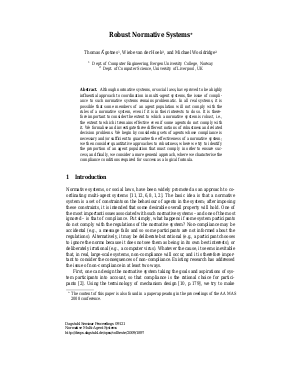Robust Normative Systems
Authors Thomas Agotnes, Wiebe van der Hoek, Michael Wooldridge
-
Part of:
Volume:
Dagstuhl Seminar Proceedings, Volume 9121
Part of: Series: Dagstuhl Seminar Proceedings (DagSemProc) - License:
 Creative Commons Attribution 4.0 International license
Creative Commons Attribution 4.0 International license
- Publication Date: 2009-03-11
File

PDF
DagSemProc.09121.27.pdf
- Filesize: 198 kB
- 18 pages
Document Identifiers
Subject Classification
Keywords
- Normative systems
- robustness
- fault tolerance
- complexity
Metrics
- Access Statistics
-
Total Accesses (updated on a weekly basis)
0Document
0Metadata
Abstract
Although normative systems, or social laws, have proved to be a
highly influential approach to coordination in multi-agent systems,
the issue of emph{compliance} to such normative systems remains
problematic. In all real systems, it is possible that some members
of an agent population will not comply with the rules of a normative
system, even if it is in their interests to do so. It is therefore
important to consider the extent to which a normative system is
emph{robust}, i.e., the extent to which it remains effective even
if some agents do not comply with it. We formalise and investigate
three different notions of robustness and related decision problems.
We begin by considering sets of agents whose compliance is necessary
and/or sufficient to guarantee the effectiveness of a normative
system; we then consider quantitative approaches to robustness,
where we try to identify the proportion of an agent population that
must comply in order to ensure success, and finally, we consider a
more general approach, where we characterise the compliance
conditions required for success as a logical formula.
Cite As Get BibTex
Thomas Agotnes, Wiebe van der Hoek, and Michael Wooldridge. Robust Normative Systems. In Normative Multi-Agent Systems. Dagstuhl Seminar Proceedings, Volume 9121, Schloss Dagstuhl – Leibniz-Zentrum für Informatik (2009)
https://doi.org/10.4230/DagSemProc.09121.27
BibTex
@InProceedings{agotnes_et_al:DagSemProc.09121.27,
author = {Agotnes, Thomas and van der Hoek, Wiebe and Wooldridge, Michael},
title = {{Robust Normative Systems}},
booktitle = {Normative Multi-Agent Systems},
series = {Dagstuhl Seminar Proceedings (DagSemProc)},
ISSN = {1862-4405},
year = {2009},
volume = {9121},
editor = {Guido Boella and Pablo Noriega and Gabriella Pigozzi and Harko Verhagen},
publisher = {Schloss Dagstuhl -- Leibniz-Zentrum f{\"u}r Informatik},
address = {Dagstuhl, Germany},
URL = {https://drops.dagstuhl.de/entities/document/10.4230/DagSemProc.09121.27},
URN = {urn:nbn:de:0030-drops-18971},
doi = {10.4230/DagSemProc.09121.27},
annote = {Keywords: Normative systems, robustness, fault tolerance, complexity}
}
